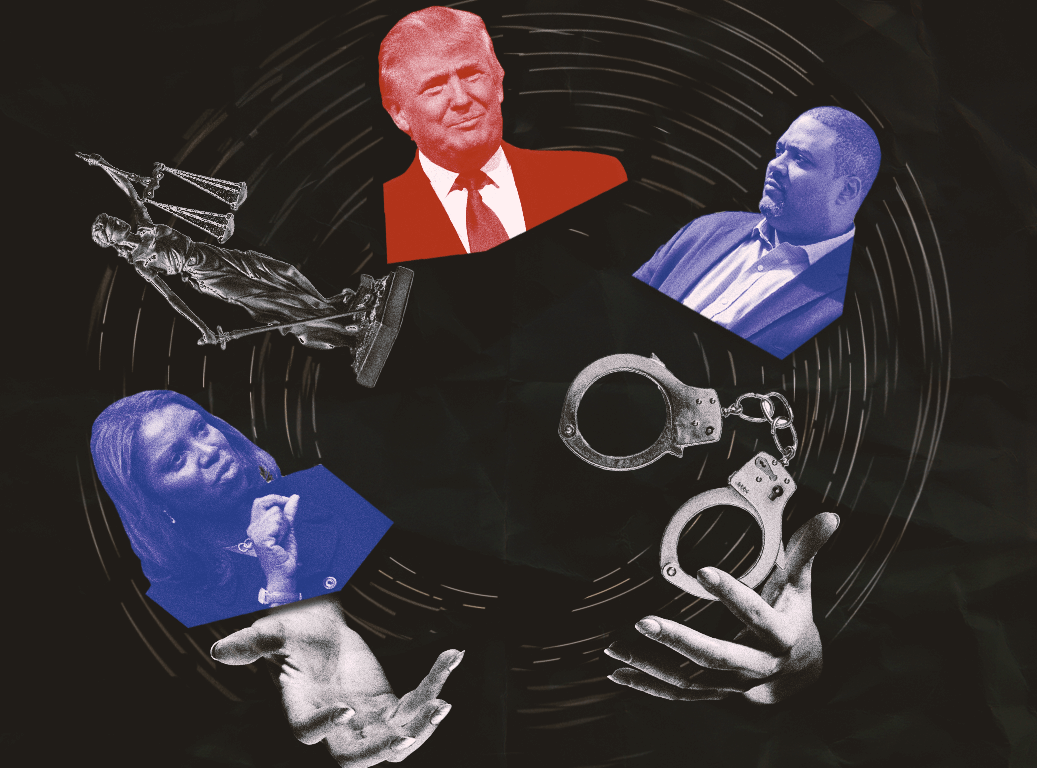This article originally appeared on our substack
As of April 9, 2022, there are as many as twenty active civil and criminal investigations into former President Donald Trump at the federal, state, and local levels. Two of the most prominent cases take place in my home state of New York. The civil investigation in New York is being overseen by Attorney General Letitia James, who is looking into whether Trump committed fraud by inflating the worth of his real estate holdings. The criminal case, looking into essentially the same business practices, is being handled by Manhattan District Attorney Alvin Bragg.
These probes are the most significant X-factor in the 2024 election. They’re ticking time bombs for the former president and his political aspirations – with possible outcomes ranging from crippling financial penalties to jail time.
But Trump is not the only one at risk from these investigations. In both cases, Democrats are letting their hatred of the former president blind them to significant ethical lapses that will pave the way for increasingly partisan political prosecutions.
The Precedent
For context, let’s go back to 2018 when Matthew Whitaker took over as acting attorney general. As a legal pundit on TV, Whitaker repeatedly criticized the Mueller probe for which he was now responsible. For example, on CNN he opined about whether Sessions should be replaced with someone who “just reduces [Mueller’s] budget to so low that his investigation grinds to almost a halt.”
You’d think Whitaker’s statements would be enough to warrant his recusal from the case—which is precisely what a top DOJ ethics official advised, citing an “abundance of caution.” Yet Whitaker refused to step aside because he did not wish to “create the first precedent requiring recusal in a ‘close call’ situation.”
Whitaker did not last long in his role, but his replacement, William Barr, came in with similarly questionable impartiality. Barr, before taking over as attorney general, made skeptical comments about the Mueller probe, even writing a memo to DOJ officials claiming Mueller was using a “fatally misconceived” legal theory.
Barr would go on to oversee the investigation through its conclusion and would be widely accused of undermining Mueller.
Democrats had a right to be incensed as back-to-back attorneys general flouted ethical norms. Back when Whitaker ignored his ethics official, senior Democratic congressional leaders, including leaders Pelosi and Schumer released a letter blasting the decision. They called for Whitaker’s immediate recusal, laying out a clear and convincing standard:
The official supervising the Special Counsel investigation must be – in both fact and appearance – independent and impartial. Regrettably, Mr. Whitaker’s statements indicate a clear bias against the investigation that would cause a reasonable person to question his impartiality. Allowing a vocal opponent of the investigation to oversee it will severely undermine public confidence in the Justice Department’s work on this critically important matter.
I agree with every word of this letter. The appearance of impartiality matters because appearances are often all we have. We can’t read minds. If an incoming prosecutor previously expressed an opinion about an ongoing investigation, especially an investigation involving a political ally or opponent, that prosecutor should create a clear wall between themselves and the people conducting and overseeing the case. This is especially true in cases where the prosecutor is politically appointed or elected, given the incentives involved. One could reasonably question whether Whitaker and Barr were publicly auditioning for the attorney general role by signaling to the president how they’d handle the case.
I also agree that public confidence matters, especially in politically sensitive cases. It’s not enough for someone to say they are impartial; it’s important for the public to trust that they are.
There’s ample precedence for this standard. When Eric Holder became attorney general in 2009, he recused himself from overseeing the investigation of John Edwards to avoid the appearance of conflict. He cited his role in Barack Obama’s vice presidential selection committee, which had considered John Edwards and presumably learned about his alleged improprieties before they broke. Then there’s Jeff Sessions, who famously recused himself from the Mueller probe, citing his work as a campaign surrogate for Trump. His announcement came on the heels of revelations that he’d had multiple encounters with the Russian ambassador in the prior year. Trump never forgave him for that decision and eventually forced him out.
In short, I agree with the standard Democrats laid out in their letter, and I believe Whitaker and Barr undermined a core principle of legal ethics that’s been applied by attorneys general from both sides of the aisle. That’s why it’s even more frustrating to see Democrats now violating the very same standards in their investigations of former President Donald Trump. What was once a bipartisan commitment to uphold the standard has become a bipartisan commitment to ignore it.
The James Investigation
That brings us back to New York’s investigations of Trump. While running for attorney general in 2018, Tish James gave an interview to Yahoo News in which she said, “The President of the United States has to worry about three things: Mueller, Cohen, and Tish James. We’re all closing in on him.” During her victory speech in November 2018 she promised to “shine a light” on Trump’s real estate deals, adding, “New Yorkers, we can spot a con man. We can spot a carnival barker. I will shine a light into every dark corner of his real estate dealings, and every dealing.”
Let’s examine these statements using the standard that Democratic leaders used back when they criticized Whitaker.
Is there reason to question the “appearance” or “fact” of James’ impartiality? Undoubtedly. Before she even stepped foot into the AG’s office, reviewed the evidence, or (presumably) spoke to a single of the case’s prosecutors, she was already saying she was “closing in on him” and that Trump had to “worry” about her.
Did James’ statements undermine public confidence in the investigations? I’d say so. Sure, the most ardent Democrats have full confidence in James and have been cheering on her every move. The same could be said of die-hard Republicans with Whitaker and Barr. But what would someone free of partisan motivations think of James’ stated aims?
Consider this hypothetical. Imagine a Republican candidate for attorney general in Arkansas, running on the platform to “lock up the Clintons,” promising to shine a light on every aspect of the finances of the Clinton Foundation and Clinton Library and committing to reopen the Whitewater investigation. Now imagine that this candidate won and refused to recuse themself, and publicly and gleefully shared each triumphant step of the investigation.
That’s essentially what’s happened in the case of James, but with the parties and presidents switched.
That’s not to say the evidence for the alleged crimes are the same. Do I think the Clinton Foundation broke any law? No. Do I think Whitewater was largely bullshit? Yes.
To say James should recuse herself isn’t to say Trump is innocent. It’s very likely he broke the law. But a career prosecutor, walled off from the appearance or fact of political influence of James, can and should make that determination. We’re talking about a former President of the United States who may very well run again. Democrats such as James have every political motivation to use the law to prevent Trump from running. No matter what we think of Trump, we should ensure that any investigation of him is free of every conceivable partisan bias.
The Bragg Investigation
The case of Manhattan District Attorney Alvin Bragg is a much closer call. On the campaign trail in 2019 and 2020, he was largely more cautious than James, saying things such as “I haven’t seen all of the evidence” and “I’m prepared to go where the facts take me once I am in office.” But he did occasionally toe the line. In one Hot 97 interview, he said “I’ve seen him upfront and seen the lawlessness he can do,” adding “I believe we have to hold him accountable.”
Bragg’s comments are by no means a slam dunk case for recusal, but they were enough to convince me that he should step aside. Some background: I was an early supporter of Bragg’s campaign. The political organization I was running at the time was the very first group to endorse him, and I helped prepare him for some of his early campaign forums and debates.
In November 2021, just after Bragg won election, and weeks before he assumed office, I interviewed him, pressing him on his past statements about Trump. He pushed back against the suggestion that he recuse himself, saying, “I think this may very well be the most consequential case in this history of local prosecution. Having just gone through a campaign where I didn’t say I would do that [recuse himself], I think that would be an abdication.” You can watch the exchange here.
Fast forward to March 2022. Mark F. Pomerantz and Carey Dunne, Bragg’s two most senior prosecutors working the Trump case, resigned from the DA’s office, arguing in a letter that Trump was “guilty of numerous felony violations” and that it was “a grave failure of justice” not to hold him accountable.
According to reporting from the New York Times, the lead prosecutors and Bragg were at odds over the strength of the evidence:
While Mr. Dunne and Mr. Pomerantz were confident that the office could demonstrate that the former president had intended to inflate the value of his golf clubs, hotels and office buildings, Mr. Bragg was not. He balked at pursuing an indictment against Mr. Trump, a decision that shut down Mr. Pomerantz’s and Mr. Dunne’s presentation of evidence to a grand jury and prompted their resignations.
The Times also reported that three other prosecutors had left the team the year prior, under Bragg’s predecessor, because they were “uncomfortable with the speed at which it was proceeding and with what they believed were gaps in the evidence.”
What are we to make of this? Two prosecutors resigned saying the case was moving too slow and three resigned saying the case was too fast. It’s possible that new evidence changed the dynamic over the course of the year, but Bragg didn’t seem to think so.
When this news originally broke, Bragg said very little. His spokesman released the following statement:
A team of experienced prosecutors is working every day to follow the facts and the law. There is nothing more we can or should say at this juncture about an ongoing investigation.
Bragg later added in an interview that “The second we start thinking we’re politicians, we’ve taken a real wrong turn,” adding, “There’s a part of me, the non-lawyer part, that wants to have a conversation. But the part that’s been a career prosecutor tells me I can’t.”
The social media uproar over Bragg’s perceived lack of enthusiasm for the case was swift and unforgiving. We were greeted by a sea of blue checkmarks calling for primary challenges to Bragg in the next election, speculating as to whether Bragg was corrupt, even implying that he should be impeached.
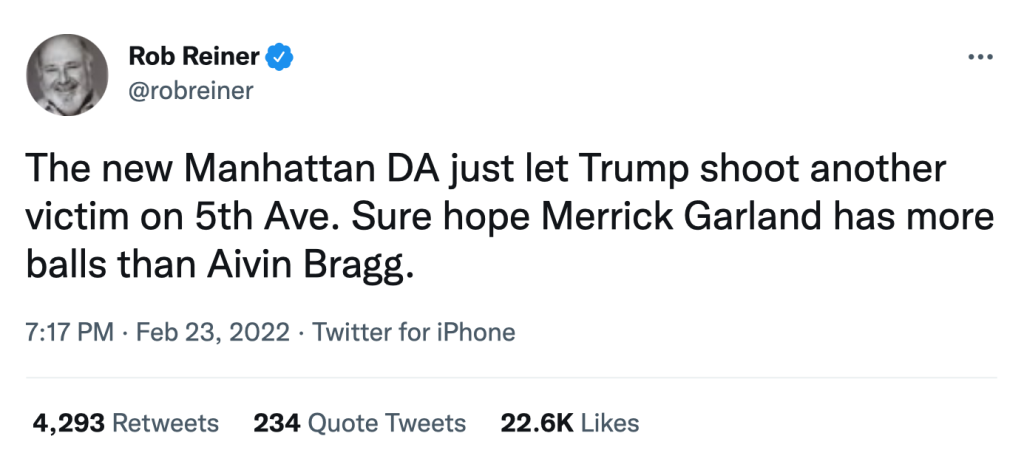
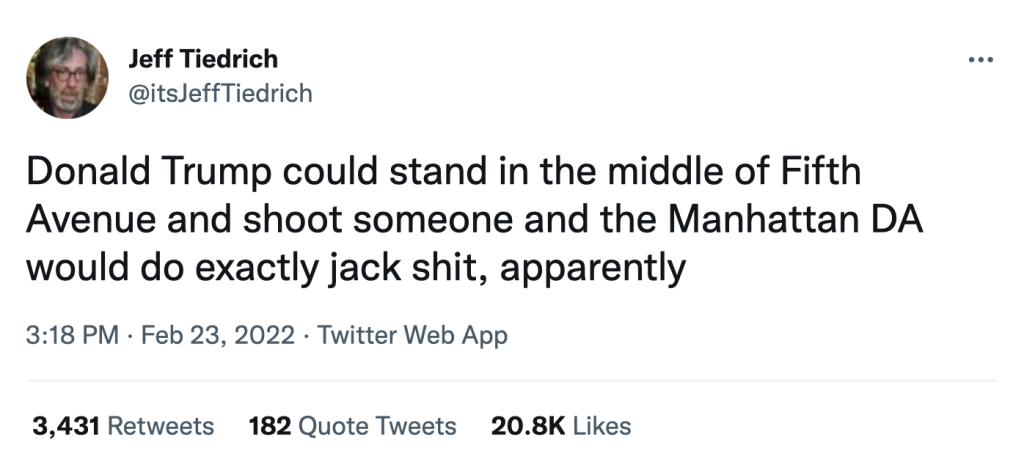
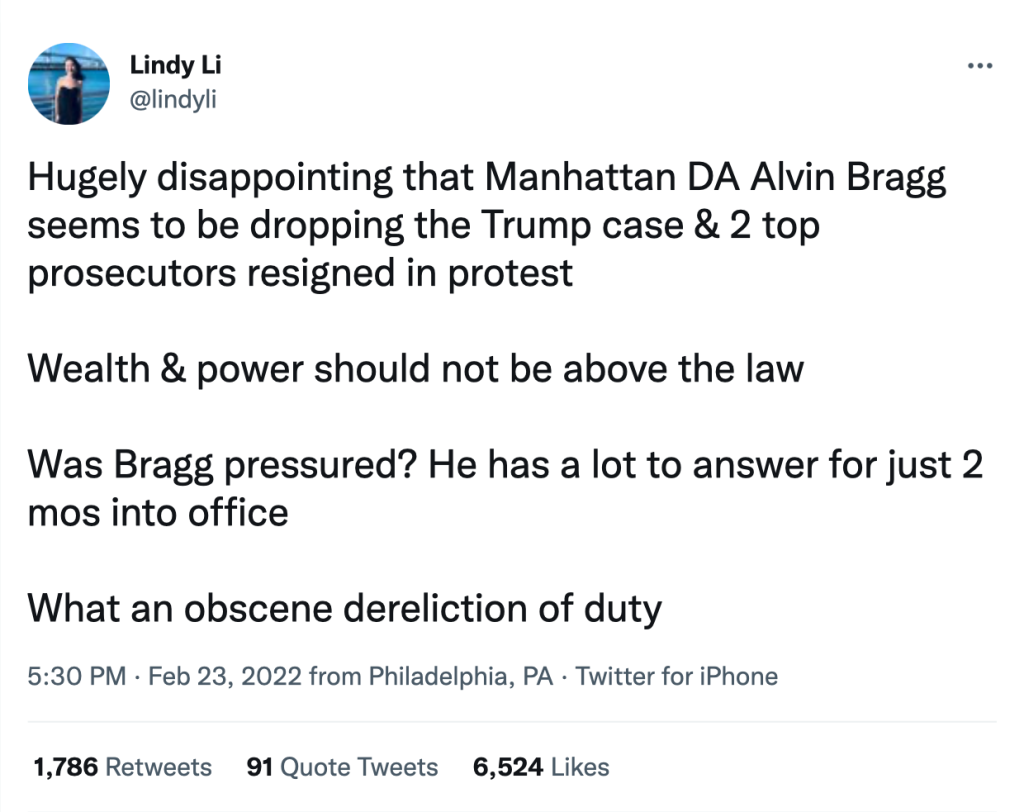
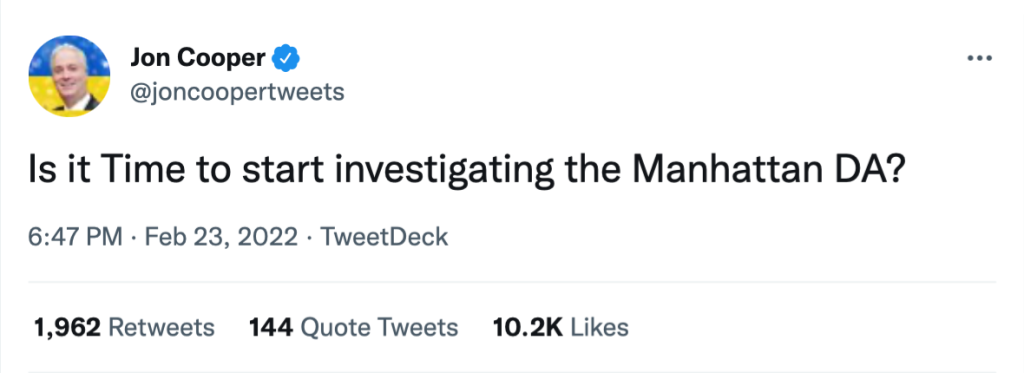
It’s notable that progressives were largely focused on the two prosecutors who felt the case was moving too slow—and ignored the other three who felt the opposite.
I believe Bragg has largely publicly laid out the correct standard for this case. He’s right to refuse requests to provide detailed information on an ongoing investigation, which is standard practice for prosecutors. He’s also right to say he shouldn’t act like a politician. If you doubt that he has every political incentive to prosecute Trump, just search “Alvin Bragg” and “resign” on Twitter.
But I can’t help but think he and most involved would be better off if he’d originally recused himself. Ironically, if he had, there would likely already be charges filed against Trump right now, in April 2022 (which underscores my earlier point that this is about correct ethics and appropriate processes, not about any one outcome). My worry, and I have no inside knowledge to confirm this, is that there’s a real risk that Bragg may bend to public pressure. There are already signs that this may be the case. Earlier this month, he publicly stated that he’s reviewing “new evidence from the case,” and his team is “going through documents, interviewing witnesses, and exploring evidence not previously explored.”
I have no idea what Bragg will do next, but if he eventually brings charges, critics will argue that he changed his mind in response to threats from an overwhelmingly anti-Trump electorate. We will have no way to know whether those critics are correct.
Trump’s Legacy
Of course, the target of these investigations, the former president, will accuse anyone who comes after him of partisan bias. He even accused Mueller, a registered Republican, of bias. His most ardent supporters will never be satisfied by any level of impartiality or any depth of evidence against him. But just because he and his supporters will never be satisfied doesn’t mean we should give up any effort at delivering impartial justice.
Some may point out that my approach is another example of Democrats unilaterally disarming. After all, Republicans conducted lengthy congressional investigations into Clinton’s emails and the Benghazi attacks. Those investigations likely hurt Clinton’s image in the lead-up to the 2020 election. Why give up your most potent weapon against a political enemy in the lead-up to his next campaign?
That framing is exactly why we should be careful. Wasn’t our conclusion from those Clinton investigations that they were wrong? Why would you want to replicate that dynamic and bend legal institutions for partisan gain? If we do that, what separates us from those we criticize?
We shouldn’t use the lowest common denominator as an excuse to abandon our standards. Trump’s critics have routinely said that the greatest danger of his leadership is his threat to the rule of law and democratic norms. By that, critics weren’t just worried about the proximate effect of Trump himself breaking laws and rules, but the example he’d set for others.
In that sense, Democrats are unwittingly cementing Trump’s legacy. It’s not too late to pull back, but time is running out. Attorney General James and District Attorney Alvin Bragg should immediately recuse themselves, appoint career prosecutors to oversee the cases, and publicly pledge to support whatever conclusions they draw. Most importantly, we should applaud them when they do so.
